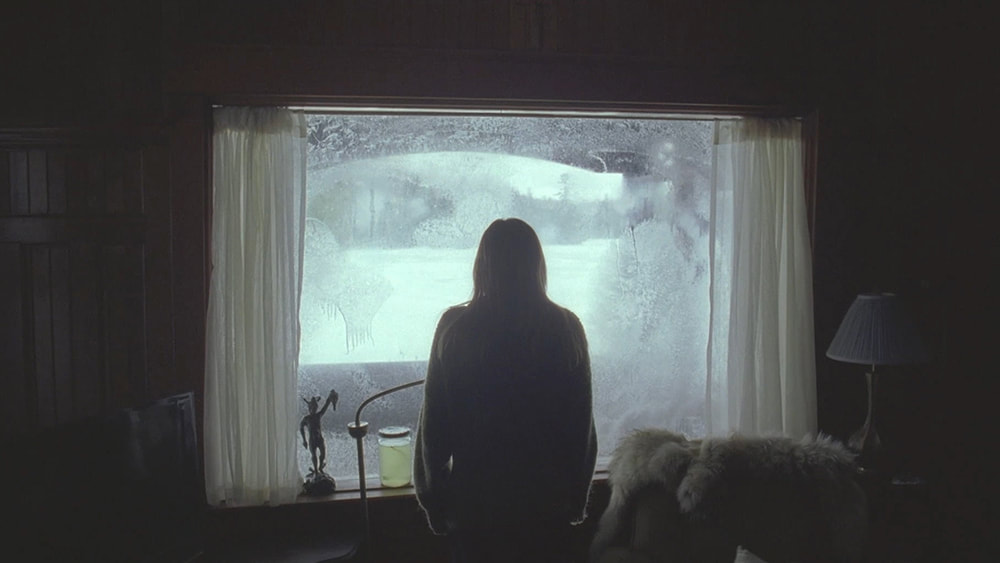|
by Philip Price Director: Severin Fiala & Veronika Franz Starring: Riley Keough, Jaeden Martell & Lia McHugh Rated: R Runtime: 1 hour & 48 minutes Though I’m unaware of the status of the Catholic church in Austria or if writer/directors Severin Fiala and Veronika Franz were raised in the faith, what I do know is they seem to believe there is something severely fucked up about the level of veneration involved in the traditions of the faith; a reverence that combines ill-advised symptoms like blind conviction and fear mongering ultimately convincing followers they're of the "chosen" variety while threatening them with the idea of eternal damnation to insure they don't stray too far from the pre-ordained beliefs and practices.
I say Fiala and Franz feel this way as their second narrative feature “The Lodge” focuses on a young woman, appropriately named Grace (Riley Keough), who is the lone survivor of a suicidal cult, but the buck doesn't stop there as said cult was run by none other than Grace's father. Again, I say the film focuses on the character of Grace, but as a viewer sitting down to watch this film after reading this review one might think I was making as much up given audiences are first introduced to the Hall family consisting of father Richard (Richard Armitage), mother Laura (Alicia Silverstone) and children Aiden (Jaeden Martell) and Mia (Lia McHugh). Richard and Laura have separated, but Richard is presently seeing someone else (you guessed it, Grace) and Laura - to say the least - is not coping well. All of THIS to say “The Lodge” really isn't any of their movie despite the first impressions. This is Grace's film and it's a shame Fiala and Franz don't make it a point to make her movie sooner. “The Lodge” seemingly wants to examine the impact of such extreme trauma and conditioning by cults who have the ability to conjure such devotion that they can convince the majority of their following to take their own lives while continuing to live on in the consciences of those who couldn't bring themselves to do it even after escaping said environment. This is the fragile mental state in which Grace enters the picture as this new, potentially maternal figure to these two children who couldn't despise her more. While the circumstances are less than ideal and don't wholly make sense from the perspective of either Grace or Richard the bigger picture isn't initially apparent thus allowing the viewers some grace in buying into the admittedly engaging set-up. It is how Fiala and Franz guide their narrative that makes the film less chilling and more bewildering as “The Lodge” slowly reveals itself to be an empty shell playing on the notions of more grounded, deliberate horror films that have come before. That isn't to say everything “The Lodge” offers is more style in service of little to no substance, but Fiala and Franz would have one believe the exact opposite as if every aspect of their film's construction is specific and intentional. Despite this facade though, the events that come to transpire couldn't feel less exact as the writer/directors very clearly want to discuss the type of guilt and conflicted sense of self that arises from never being able to travel outside the brim of structure that religion paints around those brought up in radical denominations, but are never able to find a way of materializing these themes and ideas. Much like writing, it’s easy to sit down and know what you want to write about, but it’s a lot harder to create something that actually embodies those ideas in a clear and concise form; a true representation of the thoughts you hoped to convey. Instead, “The Lodge” boils down to a half-baked, uber-elaborate prank of a plot twist that makes zero to no sense when taking everything that has occurred prior into consideration. It's the definition of faking it till you make it, if you will, except The Lodge isn't able to make anything out of the iconography it shoves down the audience's throat as if to hope the mere presence of such images and symbols are enough to represent a meaningful interpretation. It's not. As someone who was raised in the Catholic church I will mention that anytime I would complain about having to kneel my, some would say steadfast others would say single-minded, Catholic mother would reply by asking me if I thought Jesus complained about having to be nailed to the cross which would instantly shut me up. So, upon seeing Grace deal with the hallucinations of her father and the guilt he could easily provoke causing her to go to such extremes as kneeling on burning logs in order to repent makes me not go so far as to say I "get it" as I certainly wasn't traumatized as a child, but the layers of guilt and fear instilled in this character make complete sense and it's in this facet Fiala and Franz find their most disturbing material. There were hints early on in the film that this type of trauma-induced terror is what would sustain “The Lodge” as the imagery during a funeral scene where Mia's balloon falls to the ground because the doll that represents her deceased mother is attached while everyone else's floats upward which is then immediately followed by a scene where Mia is crying and screaming that her mother "can't go to heaven," because of what Catholicism believes about suicide is simultaneously heartbreaking and genuinely disturbing. If only the film were to have explored these types of conflicts consistently through its parallel generations of traumatized characters rather than resort to a more standard horror movie trope “The Lodge” might have proved itself more a true savior of the genre rather than a false idol.
0 Comments
Leave a Reply. |
Archives
April 2024
|
